
Thanks to their efficiency in man to man combat, swords were the battlefield weapon of choice from the ancient Mesopotamian empires to the European wars of the early 20th century. However, away from fantasy, swords also have deep and extensive practical roots. More recently, the legendary Excalibur of Arthurian legend serves as the proof of Authur’s lineage and his claim to the rightful sovereignty of Britain. In Greek mythology, Zeus’s adamantine sword is how Perseus slew Medusa. In the biblical creation story, a flaming sword formed a fence around Eden that separates man from the tree of life. Hence, these blades feature, in various forms, and with different abilities, in a wide range of legends from different cultures around the world. Since these weapons take a great deal of practice to master, they also make excellent symbols for discipline and mastery, knighthood, and chivalry.įurthermore, on a more archetypal level, swords represent the power of will and intellect to reveal, conceal, unite, or to discriminate. However, watch a hero demonstrate authentic swordsmanship with a majestic sword once, and you will instinctively understand why these weapons are so deeply rooted in our collective consciousness.īy their in your face phallic design, swords symbolize power, protection, strength, courage, and authority.



Yes, most swords, at first glance, may strike you as mostly unremarkable. From Katana-wielding ninjas and samurais to King Arthur’s Excalibur, the presence of swords in almost every legend is a testament to how much these blades have permeated our fantasies.


 0 kommentar(er)
0 kommentar(er)
